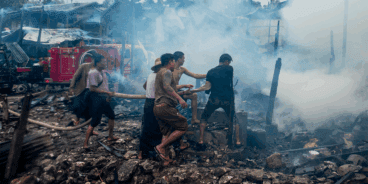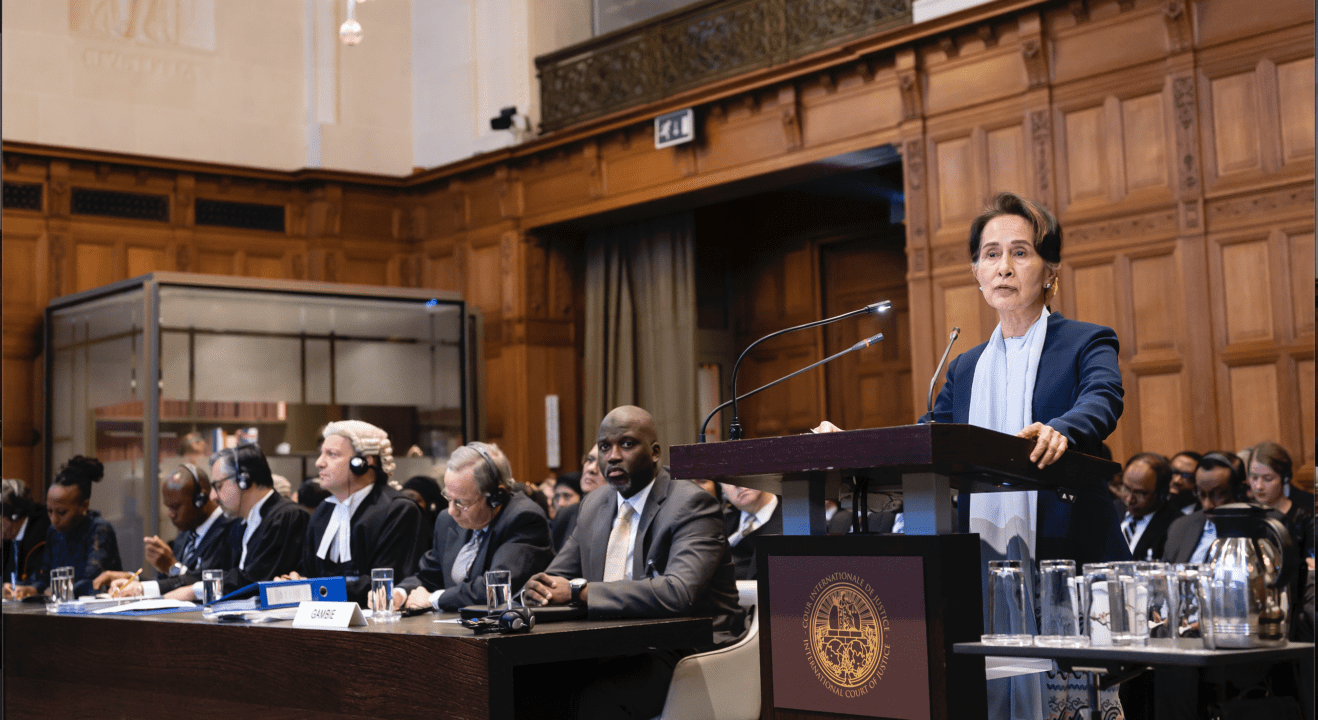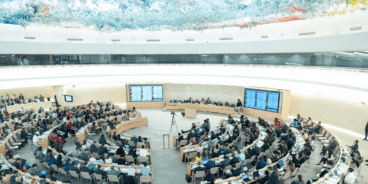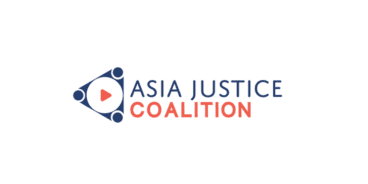

Atrocity Alert No. 187: Myanmar (Burma), Venezuela and Burundi
Atrocity Alert is a weekly publication by the Global Centre for the Responsibility to Protect highlighting situations where populations are at risk of, or are enduring, mass atrocity crimes.
International Court of Justice to issue order in Myanmar genocide case
Tomorrow, 23 January, the International Court of Justice (ICJ) will deliver its order on the request for provisional measures made by The Gambia in the case of the Application of the Convention on the Prevention and Punishment of the Crime of Genocide (The Gambia vs. Myanmar). If issued, these provisional measures will impose binding obligations on Myanmar.
The Gambia filed the historic lawsuit at the ICJ on 11 November, accusing Myanmar of violating the Genocide Convention. In its submission The Gambia requested that the ICJ order that Myanmar “prevent all acts that amount to or contribute to the crime of genocide, including extrajudicial killings, rape and other forms of sexual violence, and burning of homes.” The Gambia also requested provisional measures relating to the protection of evidence and that Myanmar allow UN investigators access to the country.
All 152 states that are parties to the Genocide Convention have an obligation to prevent and punish the crime. The Independent International Fact-Finding Mission on Myanmar (FFM) concluded that Myanmar’s military has committed acts of genocide against the Rohingya minority in Rakhine State and that the government breached its obligations under the Genocide Convention. In its final September 2019 report, the FFM also determined that all the risk factors for genocide remain present in Myanmar and that the government still “harbored genocidal intent.”
According to Article 94 of the UN Charter, judgments of the ICJ are binding and the UN Security Council can take collective action to ensure that they are upheld. Thirteen out of fifteen current Security Council members are also states parties to the Genocide Convention. It is therefore essential that the Council closely monitor and ensure Myanmar’s full compliance with any order of the Court.
Ahead of the forthcoming ICJ order, the Executive Director of the Global Centre for the Responsibility to Protect, Dr. Simon Adams, said: “This could be the first step on a path to justice for the Rohingya. If issued by the Court, such measures could help prevent further attacks against the Rohingya, preserve evidence of past atrocities and allow access to independent investigators. I hope that all members of the UN Security Council will uphold their moral, political and legal responsibility to ensure that any provisional measures imposed by the Court are expeditiously implemented.”
Venezuela: Political crisis and the threat of crimes against humanity
Tomorrow, 23 January, marks the one-year anniversary of the day that the leader of the National Assembly of Venezuela, Juan Guaidó, assumed office as acting president. The resulting power struggle between the government of President Nicolás Maduro and the Guaidó-led opposition for control of the state has continued for the past twelve months. Despite efforts by regional and international actors to respond to ongoing state-led violence, serious violations and abuses of human rights continue, some of which may amount to crimes against humanity.
Over the past year – as a result of widespread allegations of fraud during Venezuela’s 2018 elections – more than 50 countries have recognized Guaidó as interim president. The European Union, United States, Canada and others have also imposed targeted sanctions against more than 100 individuals, including senior government officials and military officers. In addition, six American countries have referred the situation to the International Criminal Court and supported the establishment of an international Fact-Finding Mission for Venezuela to investigate extrajudicial executions, enforced disappearances, arbitrary detention, torture, and other cruel, inhumane or degrading treatment.
Despite these efforts, the UN High Commissioner for Human Rights has warned that the Maduro government is using the security forces “as an instrument to instil fear in the population and to maintain social control.” Of particular concern are thousands of deaths resulting from “security operations,” many of which may constitute extrajudicial killings. According to Human Rights Watch, an estimated 18,000 people have been killed since 2016 as a result of “resistance to authority.”
One year ago, many Venezuelans were hopeful that an end to their country’s humanitarian catastrophe and human rights crisis may be near. Twelve months later, the government’s ongoing persecution of its political opponents and ongoing impunity for systematic human rights violations and abuses have created an environment conducive to further potential crimes against humanity.
More than 4,000 mass graves discovered in Burundi
Last week Burundi’s Truth and Reconciliation Commission (CVR) reported to the country’s parliament that it had documented more than 4,000 mass graves containing the bodies of 142,505 people. The mass graves date as far back as the country’s independence in 1962. Ethnic conflict between the majority Hutu population and the Tutsi minority also resulted in mass killings in 1972, 1988 and between 1993 and 2005.
The CVR’s announcement came as a mass grave in Bujumbura was opened to the public on 13 January. The grave contains the remains of 270 people believed to have been killed at the start of Burundi’s 1993-2005 civil war. The conflict, which was fought largely between ethnic Hutu armed groups and the Tutsi-dominated army, claimed over 350,000 lives. Decades later, families of the victims continue to fear reprisals. The chairperson of the CVR, Pierre-Claver Ndayicariye, said that “many more mass graves are yet to be found because people who know about them are afraid to talk or are traumatized.”
The 2000 Arusha Agreement, which ended Burundi’s civil war, called for the establishment of a truth or reconciliation mechanism. The CVR was established in 2014 and is mandated to investigate atrocities between 1885 and 2008. While the commission is working to preserve the remains of victims, the UN Human Rights Council-mandated Commission on Inquiry (CoI) on Burundi has alleged that the CVR is also complicit in the government’s attempt to “rewrite the history of Burundi.”
The temporal constraints of the CVR’s mandate prevent it from investigating current human rights violations and abuses, including potential crimes against humanity perpetrated under the current president, Pierre Nkurunziza. Since April 2015 his government has been accused of systematic violations and abuses of human rights, including extrajudicial executions and enforced disappearances. Highlighting ongoing persecution and the use of hate speech to fuel ethnic tensions, the CoI has warned that elections scheduled for May 2020 could precipitate further violence.
The government should ensure full, transparent and independent investigations into all human rights violations and abuses in Burundi. This should include holding perpetrators of all past atrocities accountable for their crimes, regardless of ethnicity, position or political affiliation.
With elections scheduled to take place in less than five months time, regional and international actors, including the African Union and East African Community, should intensify efforts to ensure free and fair elections can take place. It remains essential that the government ends the violent targeting of political opponents and the AU should increase the number of human rights observers deployed to the country. The UN Security Council should impose targeted sanctions against all those who continue to threaten peace and security in Burundi, including the list of suspected perpetrators of crimes against humanity produced by the CoI in 2018.
Related Content


Letter to UN Human Rights Council members on atrocity prevention priorities at the Council’s 60th session
